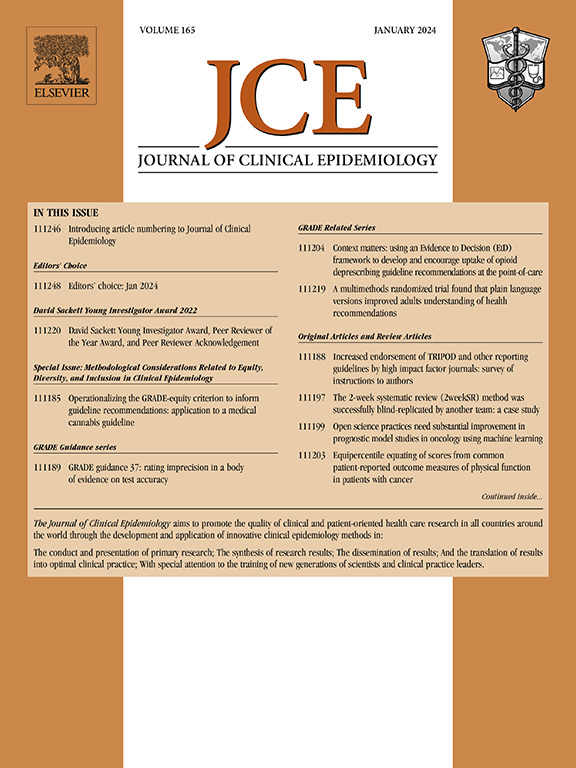Patient-reported outcomes and measures are under-utilised in advanced therapy medicinal products trials for orphan conditions
IF 7.3
2区 医学
Q1 HEALTH CARE SCIENCES & SERVICES
引用次数: 0
Abstract
Objectives
Advanced therapy medicinal products (ATMPs) are medicines based on genes, tissues, or cells and can include gene therapy, somatic-cell therapy, and tissue-engineered medicines. Patient-reported outcomes (PROs) are reports on health and well-being that come directly from the individual without external interpretation. Patient-reported outcome measures (PROMs) are questionnaires aimed at assessing the individual and subjective experience with health and other psychosocial aspects. The aim of the present review is to assess the extent and quality of PROs and PROMs used in orphan ATMP trials.
Study Design and Setting
The database from National Health Service Special Pharmacy Service horizon scanning was searched on 27 March 2024 to identify all ATMPs for orphan conditions. Clinical trial protocols were included in this review if they investigated ATMPs for orphan conditions and were published in clinical trial databases.
Results
A total of 100 trials were included. These accounted for 64 conditions. Only 37% (37/100) of the trials included PROs. Overall, 17 different types of PROs were identified across the trials. Quality of life (QoL) and health-related quality of life (HRQoL) were the most frequent PROs found in 18% (18/100) and 13% (13/100) of the trials, respectively. A total of 33 PROMs were identified. Of these, 57% (19/33) were HRQoL (89% [17/19]) or QoL (11% [2/19]) measures. Of the HRQoL measures identified, 71% (12/17) were disease specific and 29% (5/17) were generic. Of the non-QoL PROMs, 29% (4/14) were designed to measure pain and 71% (10/14) PROMs focused on other psychological outcomes, including anxiety and depression.
Conclusion
Our results show that only 37% of the orphan ATMP trials include patient-reported outcomes and measures. This highlights the urgent need for relevant PROs/PROMs that capture benefits and harms and assimilation of existing PROMs for better comparison between or within conditions. It is essential to include and reflect the patients' experience so that those intended to benefit from the research have the opportunity to influence its direction.
在孤儿疾病的先进治疗药物试验中,患者报告的结果和措施未得到充分利用。
目的:先进治疗药物(ATMPs)是基于基因、组织或细胞的药物,可包括基因治疗、体细胞治疗和组织工程药物。患者报告结果(PRO)是直接来自个人的健康和福祉报告,无需外部解释。患者报告结果措施(PROMs)是旨在评估个人和主观健康和其他社会心理方面经验的问卷。本综述的目的是评估孤儿atmp试验中使用的PROs和prom的程度和质量。研究设计和设置:于2024年3月27日检索NHS特殊药房服务水平扫描数据库,以确定所有用于孤儿疾病的atmp。如果临床试验方案研究了治疗孤儿病的atmp,并在临床试验数据库中发表,则纳入本综述。结果:共纳入100项试验。这些条件占64种。只有37%(37/100)的试验包括PROs。总的来说,在整个试验中确定了17种不同类型的PROs。QoL和HRQoL是最常见的PROs,分别占18%(18/100)和13%(13/100)。共鉴定出33个prom。其中57%(19/33)的HRQoL为89%(17/19)或11%(2/19)。在确定的HRQoL测量中,71%(12/17)是疾病特异性的,29%(5/17)是一般性的。在非生活质量问题中,29%(4/14)的问题被设计用于测量疼痛,71%(10/14)的问题被设计用于测量其他心理结果,包括焦虑和抑郁。结论:我们的结果显示,只有37%的孤儿atmp试验包括患者报告的结果和措施。这突出了迫切需要相关的PROs/PROMs来捕捉利弊,并吸收现有的PROMs,以便更好地在条件之间或条件内进行比较。必须包括和反映患者的经验,以便那些打算从研究中受益的人有机会影响其方向。
本文章由计算机程序翻译,如有差异,请以英文原文为准。
求助全文
约1分钟内获得全文
求助全文
来源期刊

Journal of Clinical Epidemiology
医学-公共卫生、环境卫生与职业卫生
CiteScore
12.00
自引率
6.90%
发文量
320
审稿时长
44 days
期刊介绍:
The Journal of Clinical Epidemiology strives to enhance the quality of clinical and patient-oriented healthcare research by advancing and applying innovative methods in conducting, presenting, synthesizing, disseminating, and translating research results into optimal clinical practice. Special emphasis is placed on training new generations of scientists and clinical practice leaders.
 求助内容:
求助内容: 应助结果提醒方式:
应助结果提醒方式:


